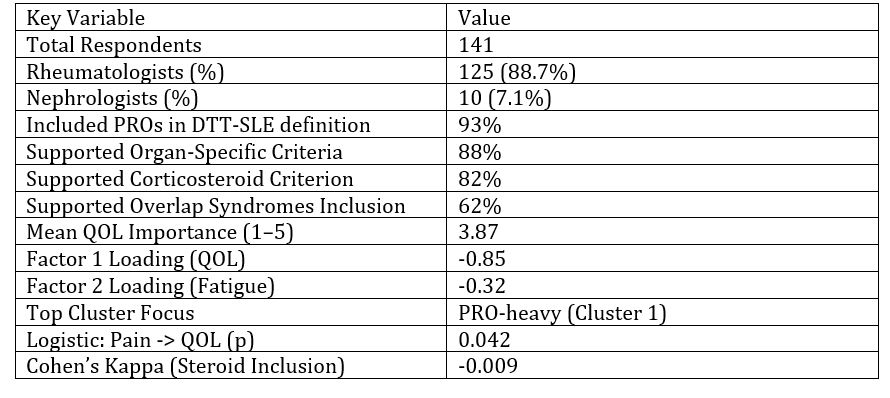Session Information
Date: Sunday, October 26, 2025
Title: (0593–0640) Systemic Lupus Erythematosus – Diagnosis, Manifestations, & Outcomes Poster I
Session Type: Poster Session A
Session Time: 10:30AM-12:30PM
Background/Purpose: Difficult-to-treat systemic lupus erythematosus (D2T-SLE) presents a major challenge due to disease heterogeneity and a lack of unified classification. While the D2T concept has advanced management in other autoimmune diseases, no operational definition exists for SLE. This study aimed to define clinician-endorsed criteria for D2T-SLE across the Middle East and North Africa (MENA) region.
Methods: A cross-sectional online survey was distributed to rheumatologists and nephrologists in 12 MENA countries. Clinicians rated factors relevant to D2T-SLE, including disease persistence, treatment failure, corticosteroid use, patient-reported outcomes (PROs), overlapping syndromes, and psychosocial factors. Quantitative analysis included descriptive statistics, exploratory factor analysis, k-means clustering, logistic regression, and Cohen’s Kappa for agreement.
Results: A total of 141 clinicians responded (89% rheumatologists). Most participants had experience in academic lupus settings, with 68% involved in research or publication and 50% in international SLE workshops. There was broad support for incorporating both clinical and PRO elements (93%), organ-specific involvement (88%), and corticosteroid dependency (82%) into a D2T-SLE definition. Top criteria included persistent moderate-to-high disease activity, failure of multiple therapies, and recurrent flares. Overlapping autoimmune syndromes—particularly APS, MAS, and Sjögren’s—were identified as major complicating factors, with 62% supporting their inclusion in D2T-SLE criteria. The agreement on corticosteroid thresholds was low (κ = -0.009).Factor analysis identified two latent domains: psychosocial burden (fatigue, psychological distress) and functional burden (pain, QOL, and activity limitation). Cluster analysis revealed three clinician phenotypes: one prioritizing PROs, another emphasizing clinical damage, and a balanced group. Logistic regression showed that fatigue (p = 0.015), pain (p < 0.001), and functional impairment (p = 0.027) significantly predicted prioritization of QOL. Clinicians favored including kidney and CNS involvement in the definition, based on persistent SLEDAI-2K ≥6, BILAG A/B scores, and frequent flares.Commonly cited causes of treatment failure included primary inefficacy, secondary loss of response, toxicity, comorbidities, and non-adherence.
Conclusion: Clinicians across the MENA region strongly supported defining D2T-SLE using a composite of treatment failure, corticosteroid burden, PROs, and organ involvement. These findings align with the broader D2T paradigm seen in other autoimmune diseases and advocate for a multidimensional, consensus-based framework. This study provides the quantitative foundation for future international classification efforts.
 Table 1. Summary of Key Findings from the D2T-SLE Clinician Survey
Table 1. Summary of Key Findings from the D2T-SLE Clinician Survey
To cite this abstract in AMA style:
Almarzooqi A, Al Qassimi S, Ziade N, Omair M, Al emadi S, ALBALUSHI F, Hafiz W, Khogali H, Naji S, Attar S, Alnaqbi K, Namas R. Toward a Consensus-Based Definition of Difficult-to-Treat Systemic Lupus Erythematosus: A Multinational Survey of Clinicians from the MENA Region [abstract]. Arthritis Rheumatol. 2025; 77 (suppl 9). https://acrabstracts.org/abstract/toward-a-consensus-based-definition-of-difficult-to-treat-systemic-lupus-erythematosus-a-multinational-survey-of-clinicians-from-the-mena-region/. Accessed .« Back to ACR Convergence 2025
ACR Meeting Abstracts - https://acrabstracts.org/abstract/toward-a-consensus-based-definition-of-difficult-to-treat-systemic-lupus-erythematosus-a-multinational-survey-of-clinicians-from-the-mena-region/
